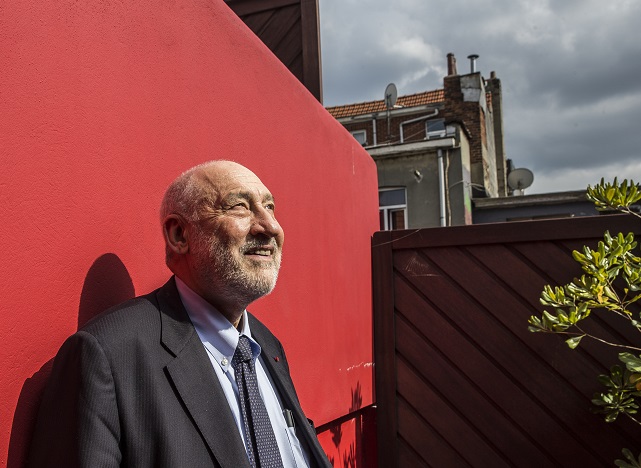Europe has lost a decade, according to Nobel Prize winning economist Joseph Stiglitz. In an interview, he called for an end to austerity and more public funding. He defended ECB President Mario Draghi but warned the central bank's quantitative easing policy has reached its limits.

Handelsblatt interviewed Joseph Stiglitz, American economist and professor at Columbia University and winner of Nobel Prize in Economic Sciences. Source: Erik Luntang for Handelsblatt.
Handelsblatt talked with Joseph Stiglitz, the Nobel-Prize winning economist, in Brussels where he was addressing a conference.
Mr. Stiglitz said he was happy to be in Europe but had little joy in the topic he was here to discuss: “Europe can do better” was the title of his talk at the Hans Böckler Foundation, which is aligned with the DGB, the organization of German labor unions.
The 73-year-old economist, who served as top economic advisor to former U.S. president Bill Clinton, took the European Central Bank under his wing in the face of serious criticism from German politicians in recent weeks, but he also warned that monetary policy in the 19-nation euro zone is reaching its limits.
Mr. Stiglitz described what he wanted to see from Germany, said Europe should grow closer together and explained why it’s now up to governments to take on more of the load for bringing the continent out of its funk.
Handelsblatt:ECB President Mario Draghi is under massive attack in Germany. For good reasons or not?
Joseph Stiglitz: The critics are missing the point. Mario Draghi is taking seriously his obligation of keeping Europe going. But monetary policy is getting at the end of its rope. So the critics should rather focus on the lack of fiscal efforts especially in Germany.
Could you elaborate please?
In a downturn, monetary policy is not an effective instrument. The ECB can lower its interest rate and buy bonds, but that does not translate into more lending. It is very difficult to get private investment increased via monetary policy. So the emphasis has to be on more public investment. Germany has plenty of fiscal space for that. The returns would be quite high because we have had years of under-investment and interest rates are very low.
Wouldn’t looser fiscal policies in Germany endanger the European fiscal compact?
The fiscal compact is part of the problem. The euro zone countries have done much worse than non-euro countries since the global recession. And worse than America even though America was the source of the crisis. Europe has lost a decade.
Why?
The problem is the euro combined with the euro zone’s policies of austerity. Underlying that is a flawed economic theory that was popular when the euro was created. Take the fiscal compact. Countries like Ireland and Spain fulfilled the rules. They even had budget surpluses before the crisis. But they were among the major victims of the crisis.
What should be changed?
I very strongly support calls for ending austerity. But that will not be sufficient. You also have to deal with the imbalances within the euro area. If you had fully understood the problems of creating it maybe the euro would not have been created.
So it would be better to abolish the euro?
No, the euro is there and the costs of dissolution would be significant. The euro was created with the best intentions to bring Europe together, but it divided Europe. I think the best way would be to strengthen European cooperation. But if you cannot get it then you have to consider breaking it up. The least costly way for Europe then would be for Germany to leave. Because in that case the German exchange rate would rise and this would correct its huge export surplus.
What do you mean?
Germany’s enormous export-surplus is unsustainable in a currency union. Before the creation of the Euro the exchange rate helped to adjust for differences in competitiveness. But this is no longer possible. The creditor countries cannot bear permanent deficits. So there has to be some form of adjustment. The best way would be to keep the euro and to do it from within the currency union.
How?
There are two ways for adjustment: Increasing wages in Germany – or decrease them in the rest of Europe. It is far more difficult to decrease wages than to increase them.
But higher wages in Germany would weaken its competitiveness. How would that be helping the euro zone?
Germany has plenty of room for higher wages. According to the estimations from the IMF and others there is an undervaluation of German labour costs of around 15 percent. If you have four percent inflation for four years or five percent for three years you would have corrected the problem. From the point of view of adjustment that is not a big deal. A minor adjustment but that would make a big difference for many of the other countries of Europe.
With near full-employment, wages in Germany should grow faster anyway.
So you may need “superfull” employment. We need to think where to start getting inflation. In the case of Germany I want a little bit inflation. Having four percent inflation will not hurt anybody.
In the US there seems to be full-employment with an unemployment rate of around five percent. But the wages do not increase much either.
We have a lot of people who are disguised unemployed. The real true unemployment rate in the U.S. is much higher. We have been doing calculations about it. And it is between ten or fifteen percent. The labor force participation in the U.S. is lower than it has been in decades. We could work more, but there are no jobs.
Is this the reason for the slow wage growth in the U.S.?
Not the only one. We have created a legal environment that has weakened workers bargaining power. So we are in a world of globalization where it is very easy for jobs to be exported. If a worker demands higher wages the employer may say we will move to China. That makes workers very tame about asking for wage increases.
Will the Federal Reserve increase interest rates further this year?
I think they will increase interest rates a little bit but I am not sure if that is the right decision. Even in the U.S. we have too much austerity. We do not champion it, but we do it quietly. We have about 500,000 fewer public sector employees than before the crisis.
What is wrong with that?
Even in the U.S. we need more fiscal stimulus. The current framework is leading to a new mediocre. China’s growth will be very limited in 2016 and we have to respond on that.
We are in a period of very low productivity growth worldwide. Economic activity remains weak and interest rates are close to zero. Will this ever change?
The problems are totally man made. They are the result of the wrong policies. Some people make us believe that we’ve been destined to have this as the new normal. That is nonsense. Destiny is in our hands.
Handelsblatt -Jan Mallien writes about monetary policy for Handelsblatt.

